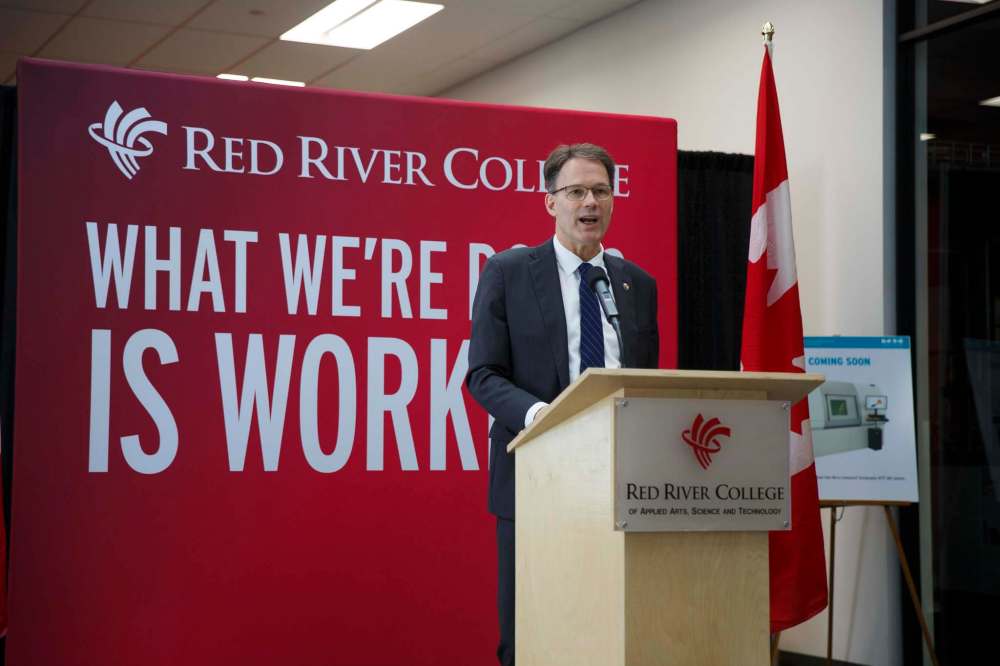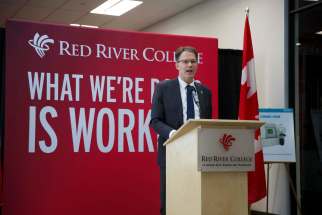Looks like Red River College leader flunked premier’s party-affiliation exam
Read this article for free:
or
Already have an account? Log in here »
To continue reading, please subscribe:
Monthly Digital Subscription
$0 for the first 4 weeks*
- Enjoy unlimited reading on winnipegfreepress.com
- Read the E-Edition, our digital replica newspaper
- Access News Break, our award-winning app
- Play interactive puzzles
*No charge for 4 weeks then price increases to the regular rate of $19.00 plus GST every four weeks. Offer available to new and qualified returning subscribers only. Cancel any time.
Monthly Digital Subscription
$4.75/week*
- Enjoy unlimited reading on winnipegfreepress.com
- Read the E-Edition, our digital replica newspaper
- Access News Break, our award-winning app
- Play interactive puzzles
*Billed as $19 plus GST every four weeks. Cancel any time.
To continue reading, please subscribe:
Add Free Press access to your Brandon Sun subscription for only an additional
$1 for the first 4 weeks*
*Your next subscription payment will increase by $1.00 and you will be charged $16.99 plus GST for four weeks. After four weeks, your payment will increase to $23.99 plus GST every four weeks.
Read unlimited articles for free today:
or
Already have an account? Log in here »
Hey there, time traveller!
This article was published 29/07/2019 (2324 days ago), so information in it may no longer be current.
In almost every regard, Paul Vogt seemed to be the right person to lead Red River College.
Hired as president of RRC in 2015, the Ivy League-educated Manitoban and former Rhodes Scholar taught public administration at the University of Manitoba, University of Winnipeg and Canadian Mennonite University.
RRC to replace president next year

Posted:
From July 29: The board of Red River College won’t renew president and CEO Paul Vogt’s contract when it expires next year, saying it “wants to go in a different direction.” Critics of the decision say they fear it’s politically motivated and one called it “the worst personnel decision at a Canadian college, maybe ever.”
Vogt arrived at a sensitive time for the college. His predecessor, Stephanie Forsyth, left her post in the summer of 2014 after it was revealed that she had claimed a number of improper personal items as business expenses. The school was in the grips of a bona fide leadership crisis that had compromised its relationships with government, business and benefactors.
However, under Vogt’s leadership, RRC not only put aside the scandals that plagued his predecessor but led the college into a period of considerable growth. Chief among the growth projects was breaking ground on a $95 million Innovation Centre to augment its well-regarded Exchange District campus and a major modernization effort that helped bring a number of other programs into the 21st century.
So, when it was revealed last week that the RRC board of governors had decided not to renew his five-year contract, it came as a shock not only to Vogt — who told RRC employees via email he was “surprised” and “disappointed” at the decision — but to just about anyone else who had come across him in his work with the college.
Why would the RRC board not renew Vogt’s contract? The only obvious flaw in Vogt’s impressive resumé is the 14 years he spent working closely with NDP governments.
Vogt spent six years a political adviser to former premier Gary Doer and another eight years as the politically appointed clerk of the executive council. And although his position at RRC is not a direct political appointment, he was hired by a RRC board that was, at the time, dominated by NDP political appointees.

When asked about whether politics played a role in the decision not to renew Vogt’s contract, board chairman Loren Cisyk declined to get into specifics. He would tell the Free Press only that the board “wanted to go in a different direction.” Education Minister Kelvin Goertzen similarly denied any suggestion he had directed the board to part ways with Vogt.
What is left? What is it about the direction of the college under Vogt’s leadership that required the board to seek a new direction? That will be a very difficult question to answer, particularly when there is independent evidence that the overall direction of the college was pretty solid.
Shortly after taking power in 2016, Premier Brian Pallister and his Progressive Conservative government announced it was doing a review of all college institutions. It hired a Toronto-based consultant, Higher Education Strategy Associates, to undertake a thorough examination of governance, programming and finances for Manitoba’s colleges.
The final report from that review, released in March 2018, gave a generally flattering picture of the work done by RRC. The college received high marks for governance and financial accountability. The one area of concern found in the report was completion rates.
On average, the consultant found that only 61 per cent of all RRC students complete their programs, seven-points below comparable schools in other provinces. However, the consultant found that the sheer breadth of programs offered by RRC, which include many niche programs that have very low enrolments and graduation rates, may be dragging down the average completion rate.
Alex Usher of Higher Education Strategy Associates went public last weekend with his concerns that Vogt’s upcoming termination was political in nature, and arguably the “worst personnel decision at a Canadian college, maybe ever.”
In general, both Vogt and the college got positive marks. We know that because the author of the report, Alex Usher of Higher Education Strategy Associates, went public last weekend with his concerns that Vogt’s upcoming termination was political in nature, and arguably the “worst personnel decision at a Canadian college, maybe ever.”
Usher noted that Vogt had trimmed the college’s senior administration, exceeding demands from the Pallister government to the province’s colleges and universities. And that he has maintained stellar relationships with leaders in the business community. “I don’t know anybody who’s got a bad word to say about what’s he’s done,” Usher said.
The oddness of Usher’s comments cannot be understated. It’s not odd because he’s supporting Vogt; there are a lot of people in Winnipeg who feel the same way.
It’s odd because he’s essentially lashing out at the very government that hired him to look at the province’s college system. That’s pretty strange behaviour from a consultant who depends on government work. However, it’s also solid proof that the decision not to renew Vogt’s contract was not performance-related. And that really does leave politics as the only other reasonable explanation.

No matter how you slice it, Vogt is most definitely a New Democrat. And that makes it awkward for him to serve at the pleasure of a premier who has a compulsive need to bully the boards of Crown corporations and agencies, a deep, almost visceral dislike of anyone associated with the NDP, and a capacity for vindictiveness that exceeds that of almost any of his predecessors.
Political appointees know that they live and die at the hands of the governments of the day. In that regard, Vogt’s impending departure from RRC is hardly surprising. He is not the first person with a partisan pedigree to be shown to the gallows by a leader of a different partisan pedigree.
But at least once, it would be refreshing to see a political leader overlook partisan leanings to keep good people doing good work.
dan.lett@freepress.mb.ca

Born and raised in and around Toronto, Dan Lett came to Winnipeg in 1986, less than a year out of journalism school with a lifelong dream to be a newspaper reporter.
Our newsroom depends on a growing audience of readers to power our journalism. If you are not a paid reader, please consider becoming a subscriber.
Our newsroom depends on its audience of readers to power our journalism. Thank you for your support.













